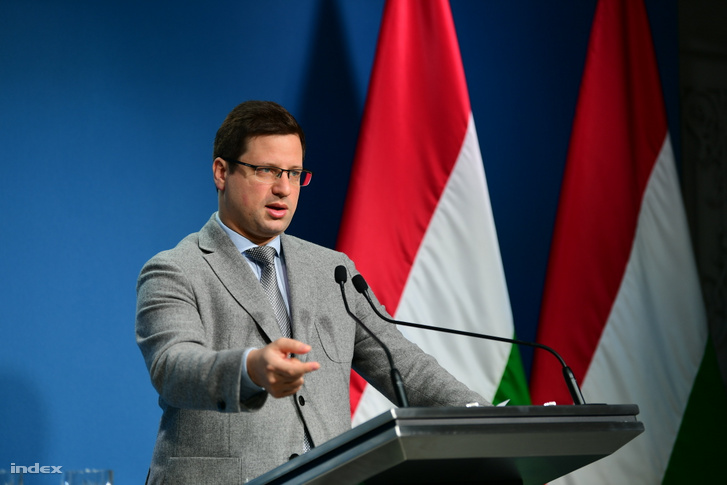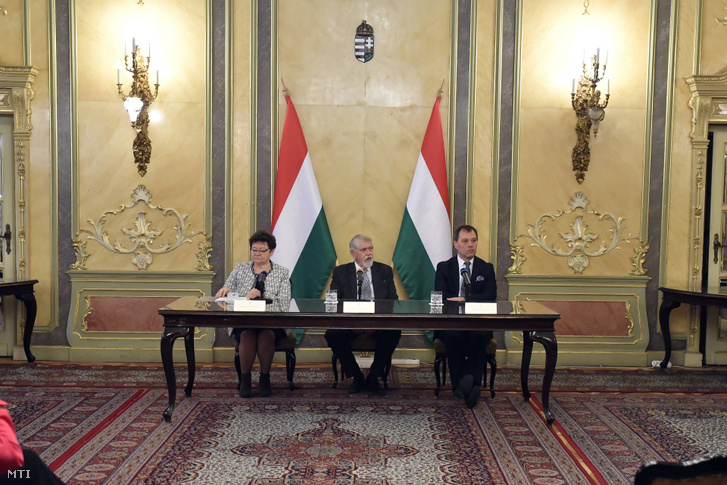Coronavirus: Hungarian evacuees return from Wuhan

- Second coronavirus patient in Hungary studied in Gödöllő
- Coronavirus spreads to Hungary, two cases found
- Third coronavirus patient in Hungary is a 69-year old British man, fourth case also confirmed
- Coronavirus in Hungary: Infected Iranian citizens watched by police in Budapest hospital
- Hungary confirms third coronavirus case
- Coronavirus: 7 cases in Hungary, the quarantined are held in 3-6 bed wards
On Sunday evening, the seven Hungarian citizens who requested their evacuation from China's quarantined Hubei province returned to Hungary, the Ministry of Foreign Affairs informed. Hungarian evacuees show no symptoms of the new coronavirus, however, they will be under quarantine in a separate building at the Central Hospital of Southern Pest for the upcoming two weeks due to the incubation period of the virus.
All Hungarian evacuees feel healthy, but they will still have to go through the two-week isolation due to the virus' incubation period which can last anywhere from five to fourteen days, Cecília Müller, Hungary's Chief Medical Officer told state news channel M1. The evacuees will be facing several tests over the next two weeks, Müller expressed her hope that they will all prove to be healthy.
Hungary was in negotiations about the evacuation with the United Kingdom, Germany, Portugal, and France, and ultimately, it was the latter that could assist in lifting the seven Hungarian citizens from China's Hubei province that is considered to be the epicentre of the outbreak. The French plane carrying 250 evacuees from 30 countries arrived at the military airbase of Istres, France on Sunday afternoon where the Hungarian evacuees boarded a Hungarian military aircraft taking them back to Budapest. After they landed, vans of the National Ambulance Service transported them to the Southern Pest hospital.
On Sunday afternoon, Menczer told state newswire MTI that all evacuees were tested for the virus twice before take-off, no Hungarians showed any symptoms of coronavirus.
János Szlávik, the Head of Department at the hospital's Institute of Hematology and Infectious Diseases said that during the two-week quarantine, evacuees will not be allowed visitors, and the hospital's medical staff working with them will be wearing protective equipment. The evacuees are facing a row of medical examinations and laboratory tests to confirm that they did not contract the disease. The first results are expected within 24 hours, which will be confirmed in the upcoming days.
Orbán: There is no problem yet, but we have to prepare for the worst
Hungarian Prime Minister Viktor Orbán spoke on state news radio Kossuth on Friday morning, where he said that while as of yet, the new coronavirus does not constitute a problem in Hungary, "we have to be prepared for the worst as well," adding that "the whole world is one great village, if something happens in one end, it reaches the other within moments."
Earlier, at the government's weekly regular press conference on Thursday morning, Chief of Staff Gergely Gulyás informed that on Wednesday, the Hungarian government had an extended cabinet meeting also attended by the country's Chief Medical Officer.

Gulyás said that there were no plans to impose restrictions on goods arriving from China. Answering a journalist's question, Gulyás responded:
air traffic between China and Hungary could be shut down in the coming days,
but as of Monday morning, the government is yet to make this call - though Hainan Airlines already announced on Saturday that they will suspend their direct flights between Budapest and Chongqing from 7 February until 27 March.
On Friday, the operative group headed by Interior Minister Sándor Pintér and Minister of Human Capacities Miklós Kásler accepted the government's action plan to counter the threat of the new virus. The measures include:
- Increased monitoring of travellers who are arriving from China or had been to the country within the last 14 days,
- Police will place all available heat cameras in service and examine the possibility of purchasing more,
- As of Monday, The National Public Health Institute launched a toll-free information hotline (so far, only in Hungarian) and will begin a campaign to raise awareness of their information website,
- Disinfection areas will be established at border-crossings,
- The National Public Health Institute will determine the protocol for virus-prevention and check stocks of medical equipment and capacities of testing laboratories.
Hospitals are prepared, universities take preventive measures
At a press conference last Tuesday, Minister of Human Capacities Miklós Kásler announced that all Hungarian hospitals are prepared for accepting cases of coronavirus, at the same time announced that two people were suspected to be infected, however, the possibility of the coronavirus was ultimately ruled out.

Also on Tuesday, the Rector of the Debrecen University, Zoltán Szilvássy announced that they requested all students from countries where the virus appeared not to travel home, and they already began to contact students who already returned. Szilvássy also informed that the university's clinic is prepared to diagnose the virus and to accept those infected. The university will also erect special gates to detect fever, and anyone with a high temperature will immediately be isolated.
Shortly thereafter, two other big Hungarian universities issued announcements to their students. Semmelweis University stated that they are prepared for students arriving from infected areas, and urged students to pay special attention to hygienic rules for the prevention of acute respiratory diseases and to frequently wash their hands and faces, and to avoid contact with sick people. Eötvös Loránd University issued a similar notice.
On Wednesday, Budapest health advisor Gábor Havasi (Momentum) said the measures taken by the government and the competent ministry concerning the prevention of coronavirus are insufficient, but urged everyone not to spread panic. Havasi accused the government that they have not done anything to prepare the healthcare system for a potential epidemic, and they have not appropriately informed the populace.

Support the independent media!
The English section of Index is financed from donations.
Az oldalról ajánljuk
- Külföld
Razziákat tartanak Brazíliában az Amazonas-vidéken az illegális erdőirtás csökkentésére
Veszélyeztetett fafajtát is találtak.
február 18., 07:22
- Belföld
Orbán Viktor közvetlen munkatársa üzent a Magyar Péter mellé állóknak
Nagy János egy Tisza István-portré előtt elmélkedett.
február 18., 08:33
- Boksz
Azon múlhat az olimpiai létéért küzdő boksz sorsa, ki lesz a NOB új elnöke
Március 18–21. között, a NOB 144. ülésén minden eldől.
február 18., 07:53
- Futball
Ami édeskevés Pilsenben a Fraditól, az itthon bőven elég
Az NB I nem az Európa-liga, megrázta magát Fehérváron az FTC.
11 perce
- Belföld
Újabb jogszabály-módosítással gyorsítaná a kormány a betegellátást a szakrendelőkben
Megszűnhet a lehetőség, hogy csak a területükhöz tartozó betegekre korlátozzák az ellátást.
február 18., 07:35
- Belföld
Tombol az influenzajárvány, a farsang elhalasztását kérik a Tolna vármegyei orvosok
Két hete a norovírus és a bárányhimlő-fertőzés is megjelent a gyermekpopulációban.
február 18., 08:03
- Vélemény
Kaphat-e Donald Trump Nobel-békedíjat?
Trump sem nevezhető amerikai konzervatív, vallásos politikusnak, inkább a politikai mainstreamen kívüli „parvenü fekete hattyúnak”.
február 18., 08:03
- Kultúr
Hatalmas felháborodást keltett a házassága, még az anyja is kitagadta
Ásvai Jókay Móric élete és halála.
február 18., 05:44
- Belföld
Nem tud több beteget fogadni a győri kórház gyermekintenzív osztálya
A zalaszentgróti kórházban is orvoshiánnyal küzdenek.
február 18., 07:01
- Gazdaság
Jobbegyenessel ütnék ki az amerikai–magyar kapcsolatok méregfogát
Már a republikánusok asztalán van a kettős adóztatás elkerülésének kérdése.
február 18., 09:04
- Külföld
Meghalt Francesco Rivella, a Nutella feltalálója
A 97 éves férfi a Kinder és a Ferrero Rocher feltalálásában is részt vett.
február 18., 09:06
- Kultúr
A minisztérium nem akar újabb balhét, de küzdelem azért lehet
Az Index információi szerint két jelölt között dőlhet el a verseny a Zeneakadémián.
február 18., 09:03
- FOMO
Dombóvári István Schobert Norbi sztrókján viccelődött, nem váratott magára sokáig a válasz
Új dumaháború kezdődik a szemünk láttára.
február 18., 07:03
- Belföld
Bicske polgármestere: Veszélyben van a város közbiztonsága
A lakosságot arra szólította fel, hogy ne kezdjenek önbíráskodásba.
február 18., 07:17
- FOMO
Patakokban folyik a tiktokosok könnye a kishaltól, amely halála előtt látni akarta a napot
Hiába fikciók a Disney-mesékbe illő magyarázatok, ez kell a népnek.
február 18., 05:48
- Kultúr
Még el sem kezdődött, de máris a legbotrányosabb Oscar-gáláról beszél a világ
Több film és színész is érintett.
február 18., 05:49
- Futball
Élen a Barcelona, de bírói csalást kiált a madridi sajtó
Két be nem fújt büntető, egy érvénytelenített Rayo-gól.
február 18., 06:45
- Külföld
A rijádi tárgyalásokon máris kiderült, hogy mi Moszkva legkeményebb feltétele a békéhez
február 18., 06:02
- Tech-Tudomány
Világhódításra indul a Meta, a Föld leghosszabb kábelét készülnek éppen megépíteni
Az egész bolygót körbeéri majd az új kábel.
február 18., 06:37
- Külföld
Trump és Putyin is igazi nehézfiúkat vet be a mai sorsdöntő tárgyalásra Ukrajnáról
Óriási a várakozás, hogy mire jut a kedden először tárgyaló orosz és amerikai küldöttség.
február 18., 05:58
- Belföld
Mínusz 15 fokig csökkenhet a hőmérséklet kedden
Dermesztő hideg lesz az országban.
február 18., 06:03
- Cellanapló
Már szerdán megjelenhet egy új iPhone, mutatjuk, mit lehet tudni róla
De más újdonságokkal is sokkolhat minket az Apple.
február 18., 06:01
- Belföld
Tavaly május óta eltűntként kerestek egy budapesti nőt, most kiderült, a barátja ölhette meg
Egyre több jel utalt bűncselekményre, a nyomozók pedig két férfit őrizetbe is vettek.
február 18., 08:04
- Külföld
Szakadékba zuhant egy busz Bolíviában, sokan meghaltak
Négy kiskorút az intenzív osztályon ápolnak, két felnőttet pedig azonnal meg kellett műteni.
február 18., 07:46
- Belföld
Minden előzmény nélkül fejbe lőtte ismerősét a miskolci férfi, vádat emeltek ellene
A fegyver eredetileg kóbor kutyák miatt került elő.
február 18., 06:15



























